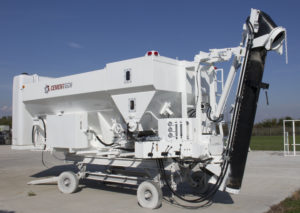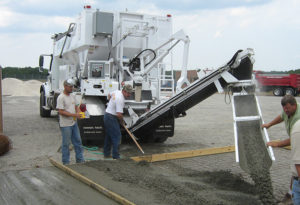10 Questions To Ask About Concrete Equipment Financing
Seeking to acquire equipment for your business? A majority of businesses in the U.S. use lease financing and it accounts for about one-third of new equipment acquisitions.
How Does Equipment Leasing Work?
Equipment leasing is a strategic financial option to consider regardless of the economic climate. But it may be attractive given the ability to maintain cash flow, preserve capital, and obtain flexible financial solutions during downturns. Uncertainty, negative economic conditions, and deteriorating forecasts are challenges to growing a business, but to remain competitive, it’s critical to be strategic when adding equipment.
Understanding the ins and outs of concrete equipment financing allows you to negotiate what’s best for your company. But, what should you know? These questions and answers are meant to acquaint and guide toward necessary information as you identify the appropriate option and terms that are right for you.
10 Questions To Ask Your Consultant
1. How Will We Be Using the Equipment?
Determining this, along with how long it’ll be used, provides an idea of the appropriate investment level for a lease. To help decide if leasing is a profitable financing option, perform a simple cost/benefit analysis. This compares the periodic leasing payment to the revenue you expect to generate from using the equipment.
2. How Well Does the Equipment Finance Company Representative Understand My Business?
Generally speaking, it’s beneficial to work with someone who understands your particular market, regardless of the sought after service. This is even more crucial with regard to leasing. The equipment finance company’s understanding of market fluctuations and other factors can greatly affect the successful outcome and desirability of a lease.
Lease Length & Customization
For one, leases can vary and lease customization that accounts for individual company needs and requirements is a key reason that businesses lease. For example, seasonal businesses need lease terms with the flexibility to miss one or more payments without a penalty during their low season.
Tax & Cash Flow Requirements
It’s also important for the equipment finance company to understand your business’s tax and cash flow requirements. For tax purposes, lease payments are an allowed tax-deductible overhead expense from corporate income. This eliminates depreciating owned equipment over five to seven years, in accordance with IRS schedules.
Impact Of Residual Rates
Residual rates — the value of the leased equipment at the end of the lease term — are another key reason to work with someone knowledgeable about your market. When a company has the knowledge and experience to set the residual accurately, they can provide the best possible lease payment schedule.
Most importantly, the equipment financier can be considered a valued consultant, providing additional benefits through lifecycle asset management solutions.
3. What Are The Total Lease Payments & Costs?
Asking this eliminates any future misunderstandings about the number of payments, the total monthly payment due, and additional costs related to insurance, taxes, and other charges. Also, ask if there are additional costs associated with the lease that may occur, including late payment fees and other surcharges.
4. What Happens If I Want to Change Or End The Lease Early?
If you wish to terminate a lease earlier than originally contracted, it’s important to remember to understand the agreed to terms. A lease is a contract between two or more parties creating obligations for those parties. Changes to the terms or length of time requested after signing and not set forth in the original agreement could result in additional payments or charges.
A master lease, which controls later leases or subleases, is designed to facilitate changes in leasing needs, and is an option many businesses choose. This type of leasing contract permits the leasing of certain assets and also enables the acquisition of additional assets under the same basic terms and conditions without negotiating a new contract, thus providing maximum flexibility.
5. What Is My Responsibility If The Equipment Is Damaged Or Destroyed?
You should know your company’s liability for the equipment before signing a lease agreement. This question will help to determine whether you must pay for or replace lost or damaged equipment.
6. Do I Have Any Other Obligations With The Equipment?
Find out if your equipment financier will assume the costs for the equipment’s insurance, taxes, and maintenance. Be sure these conditions are clear and included in the lease agreement, and review these provisions with the representative. Also, determine if you prefer an option where the finance company is required to handle installation, maintenance, asset management and tracking, and other services or if these services are your obligation.
7. How Can I Upgrade Or Add Equipment Under This Lease?
Unless you opt for a master lease, additional acquisitions will most likely require new contract negotiations. Businesses may anticipate growth in the future and should negotiate an option to under the original terms and conditions when structuring the agreement.
8. What Are My Options at the End of the Lease?
At the end of a lease, you have three options:
- Return the equipment;
- Purchase it at fair market value or a nominal fixed price; or
- Renew the lease agreement.
Determining the option you will take and specifying it in the original lease agreement is important. If you choose to purchase at lease end, ask when you will receive the title.
9. What Procedures Must I Follow If I Choose To Return The Equipment?
Find out how or if you need to return the equipment to the financier and what documentation and packaging materials are required. You’ll also want to know who pays for shipping and/or delivery and what the return deadline is after the lease expires.
10. Are There Any Extra Costs At The End Of The Lease?
In any contractual agreement, avoid unforeseen fees and costs should whenever possible. Along with costs at the beginning and during the lease, ask if there could be additional costs, such as late payment fees. Know when all payments, fees, and costs are due.
Contact a Concrete Specialist today to learn more about your concrete equipment finance options.








